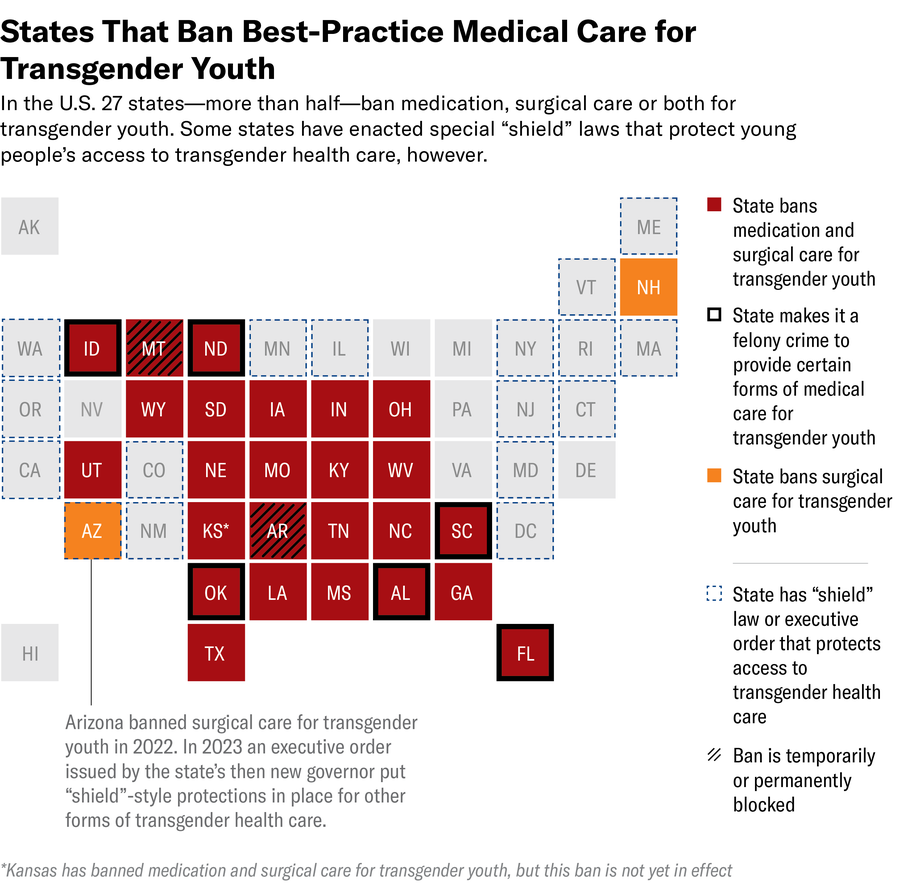February 25, 2025
5 min read
Transgender Youth Have Better Emotional Health After Taking Hormones, New Study Finds
Hormone therapy improves transgender young people’s well-being and social relationships, but Trump’s recent executive order and state bans threaten to take it away

A demonstrator at the Rise Up for Trans Youth rally against President Donald Trump’s executive actions targeting transgender people in New York City on Feb. 7, 2025.
Stephanie Keith/Bloomberg via Getty Images
Suicide attempts among transgender and nonbinary youth jumped by as much as 72 percent from 2018 to 2022 in states that had recently passed laws to curtail their rights. And President Donald Trump took this onslaught to the federal level last month when he signed an executive order to cut federal medical care support for trans people aged 19 and younger, which two federal judges have since temporarily blocked. These political actions affect a set of young people who already had much higher rates of depression, anxiety, self-harm and suicide attempts than their nontransgender peers. Many of the recent state laws ban gender-affirming care—which a 2022 study suggests is a lifeline for many trans youth. In the study, those who received gender-affirming care had 60 percent lower odds of depression and 73 percent lower odds of suicidality over a 12-month follow-up than those who did not.
A growing body of evidence supports the mental health benefits of gender-affirming care for trans youth—including puberty blockers, hormone therapy and, in very rare cases, surgery. Now a new study adds to this evidence: it’s the first of its kind to show that hormone therapy improves overall emotional health among trans youth.
For the new study, published in January in the Journal of Adolescent Health, researchers tracked the emotional health of 315 trans youth aged 12 to 20 for two years after they began using hormone therapy (testosterone or estrogen). Emotional health is a component of mental health that concerns feelings; it shapes how we act in relationships, react to struggles and generally behave in everyday life. The study also tracked appearance congruence, a measure of how much a person’s physical presentation matches their gender identity.
On supporting science journalism
If you’re enjoying this article, consider supporting our award-winning journalism by subscribing. By purchasing a subscription you are helping to ensure the future of impactful stories about the discoveries and ideas shaping our world today.
Over two years, appearance congruence (based on a validated nine-question metric) improved in tandem with all five domains of emotional health: psychological well-being; self-efficacy, or the belief that one can achieve one’s goals; social satisfaction, including friendship, emotional support and loneliness; negative social perception, or perceived hostility and rejection; and negative affect, or anger, sadness and fear.
Before taking hormones, the participants, on average, had what the authors called “clinically concerning” scores in the areas of friendship and life satisfaction. After just six months of taking hormones, however, these averages reached healthy levels. The study authors declined to comment on the findings.
“This adds to a body of literature that’s already shown improvements in mental health outcomes and safety,” says Jae Corman, an affiliate assistant professor of health systems management and policy at Oregon Health & Science University and head of analytics and research at gender-affirming care service FOLX Health. “This is another important dimension: emotional health.” Corman was not involved in the new study.

Emotional health often doesn’t receive as much public attention as the broader category of mental health, but the study authors write that it’s crucial to the latter—and to physical health as well. Higher psychological well-being and perceived social support, for example, are associated with lower rates of disease and death. Positive mood is linked to school engagement, sleep quality and increased exercise, and negative mood is associated with a weakened immune system. Loneliness in young people is correlated with depression and anxiety symptoms, problematic alcohol use and an increased risk of long-term mental illness.
Trans youth who hadn’t undergone significant puberty-related changes before starting hormones—either because they took puberty blockers or had late-onset puberty—had better psychological well-being and negative affect scores before starting hormones than those who had already begun puberty. The study authors write that this may be because those who are able to access puberty blockers are more likely to have supportive families with the ability to afford the medication. Or, they add, it could be because they hadn’t yet developed unwanted secondary sex characteristics such as breasts or facial hair.
Despite studies indicating the benefits of gender-affirming care for trans youth, 23 states have bans in effect, and two additional states have banned surgeries. Trump’s recent executive order takes things further: it could withdraw federal funding from hospitals that provide it and drop it from Medicaid coverage.
Trump’s new executive order calls the evidence supporting gender-affirming care for trans youth “junk science.” But numerous medical organizations, including the American Academy of Pediatrics and the American Medical Association, support transition-related care for youth, citing decades of research. “This research, as well as the clinical experience of [experts] who specialize in treating gender dysphoria show that the use of these medications to treat adolescents is both safe and effective in appropriately identified individuals,” medical organizations, including the American Academy of Pediatrics, wrote in an amicus brief to the Supreme Court for a case that will decide whether states can ban gender-affirming care for trans youth.
“What we keep seeing is positive results published in top-tier journals,” Corman says. “These are really scrutinized papers and heavily peer-reviewed, so I think we can trust the evidence here.”
“You get end results where kids are happier, less likely to engage in self-harm and more likely to be resilient and adaptive,” says Ralph Vetters, medical director at the Sidney Borum Jr. Health Program, a health center for LGBTQ+ and disadvantaged young people. “That’s what you want for any child, [transgender] or [cisgender].”
Gender-affirming hormones are generally safe for adolescents, Vetters adds. When such hormones do raise the risk of a condition, that increase is typically to the risk level associated with a given sex, he says. When people assigned male at birth take estrogen through a skin patch, for example, their blood clot risk increases from the typical male level to the typical female one.
The safety of gender-affirming hormone therapy for trans youth is backed up by the fact that, for decades, these hormones have been prescribed to cisgender youth with hypogonadism, a condition in which the gonads don’t properly release sex hormones. “Negative things are not happening to these youth,” Vetters says.
A common argument against gender-affirming care is that it’s offered too readily to young people, including those who haven’t reached a developmental stage appropriate for certain types of care, and that they might later regret transitioning. But a recent four-year study led by Corman suggested that gender-affirming hormone use is rare among adolescents and that it isn’t being prescribed to anyone younger than age 12. Another recent study found that only 0.5 percent of trans adolescents who start hormones later stop because they reidentify with the gender they were assigned at birth.
Another hesitation with hormones is that they may impair future fertility. Vetters says recent research suggests that testosterone may not permanently impair fertility, and at least some transgender men have been to get pregnant after stopping hormone therapy, though the effects are still unclear. The extent to which estrogen impairs sperm production, and to which its effects are reversible, isn’t as well researched, though Vetters says it does have some permanent effects. There are, however, options for fertility preservation, including sperm and egg cryopreservation (for those who have already undergone puberty) or testicular and ovarian tissue cryopreservation.
The bottom line, Corman says, is that gender-affirming hormone treatment is working: “It’s being prescribed as clinically necessary. So there’s really no need to ban this type of care.”

